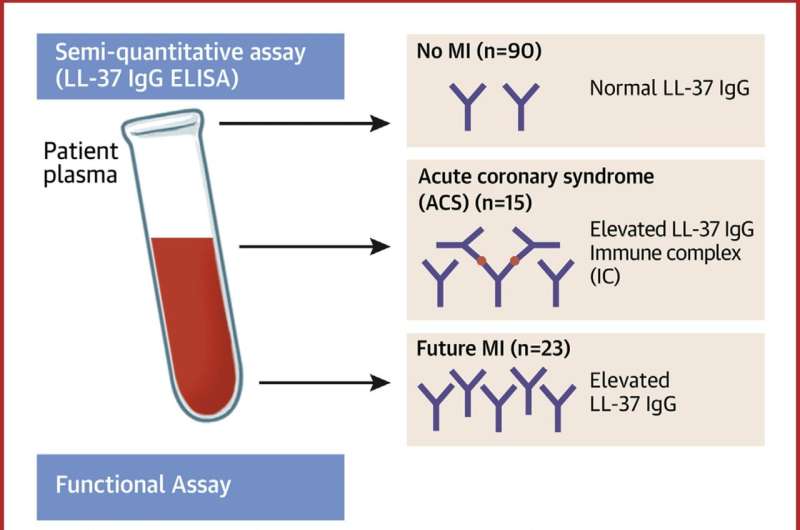This article has been reviewed according to Science X's editorial process and policies. Editors have highlighted the following attributes while ensuring the content's credibility:
fact-checked
trusted source
proofread
High levels of a specific antibody may contribute to acute coronary syndrome, investigators say

How a person's immune system responds to a protein called LL-37 may increase the risk of developing acute coronary syndrome, but the response may also serve as a potential target for future treatments. These findings come from a research study led by investigators at the Smidt Heart Institute at Cedars-Sinai.
Acute coronary syndrome refers to any condition that involves the blockage of blood flow to the heart, such as a heart attack.
The investigators previously reported that the immune system of patients with acute coronary syndrome seems to be reactive to LL-37. Other studies have reported that LL-37 triggers an immune response that plays a role in autoimmune diseases such as psoriasis and systemic lupus.
This led the investigators to hypothesize that LL-37 might contribute to an immune response that increases inflammation and leads to a tightening of blood vessels.
In this new study, published in JACC: Basic to Translational Science, the research team reports that LL-37 binds to antibodies, forming complexes that then bind to and activate platelets. These activated platelets form clots and can restrict blood flow.
"Platelets that normally should be quiescent become active in acute coronary syndrome, and they stay active even after a heart attack," said Paul Dimayuga, Ph.D., research associate professor in the Department of Cardiology at the Smidt Heart Institute and first and corresponding author of the study. "Our data suggest the immune complex formed by antibodies against LL-37 adds to the platelet activation."
To conduct the study, the investigators collaborated with the laboratory of Daniel Berman, MD, in the Smidt Heart Institute and the Department of Imaging. The laboratory is collecting blood plasma from study participants who undergo coronary artery CT imaging to evaluate their risk of a heart attack. They are following the patients over time to learn how the composition of their plasma changes.
The investigators studied the composition of the blood plasma of patients who went on to have a heart attack, as well as the blood plasma of patients who did not.
Patients who suffered a heart attack had significantly higher levels of LL-37 antibodies before the heart attack than people who did not experience a heart attack. The investigators also found that people with acute coronary syndrome had increased levels of immune complexes that formed between these antibodies and LL-37.
Experiments demonstrated these complexes have the propensity to activate platelets, suggesting a novel immune-mediated pathway of platelet activation during a heart attack and potentially a target for therapy.
With additional research, the investigators hope to understand why some people have higher levels of LL-37 antibodies than others.
"The question is: Is there a biological process that drives certain people to have an immune response to LL-37, but not others?" Dimayuga said. "We would like to study the immune cells of these individuals to see if there is something peculiar about these cells."
More information: Paul C. Dimayuga et al, A Novel Pathway of Platelet Activation in ACS Mediated by LL-37 Immunoglobulin G Autoantibody Immune Complexes, JACC: Basic to Translational Science (2024). DOI: 10.1016/j.jacbts.2024.04.012




















